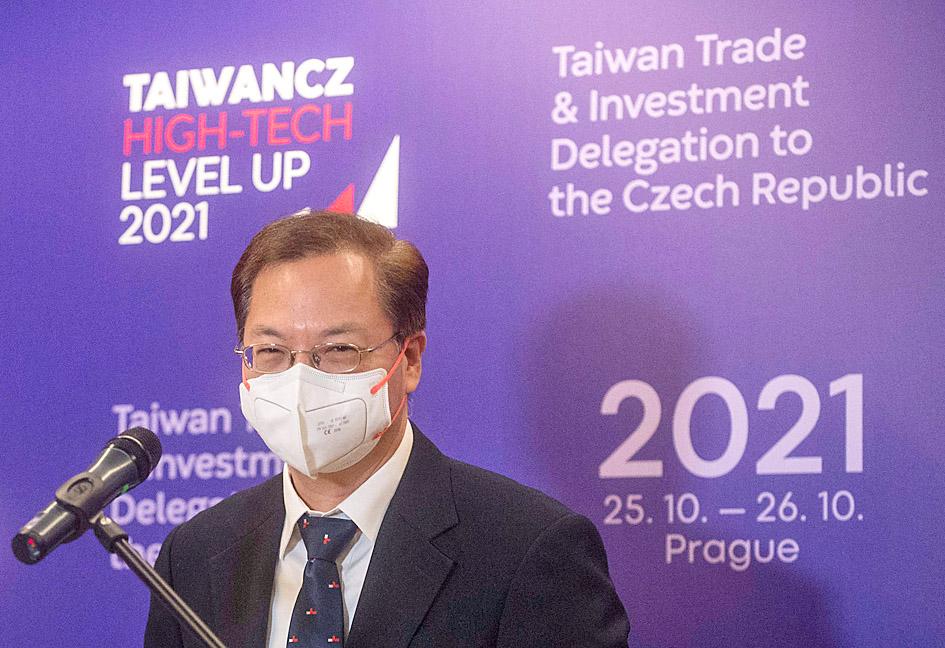A Taiwanese delegation visiting Europe has signed five memorandums of understanding (MOUs) with Czech officials to boost information sharing and technology cooperation, the National Development Council said on Monday.
Under the five agreements inked at an investment forum in Prague, the two sides agreed to bolster ties in cybersecurity, space, catalyst technology, green energy and smart machinery, the council said in a statement.
For instance, the Taiwan Space Industry Development Association is to partner with its Czech counterparts to boost information exchanges and technology development collaboration in the space sector, the statement said.

Photo: AFP
More than 170 meetings between Taiwanese and Czech companies were also arranged, it said.
The agreements marked a step forward in bilateral trade ties, the council said, after a delegation led by Czech Senate President Milos Vystrcil visited Taiwan last year and signed three MOUs to enhance exchanges in the 5G, semiconductor, health and information sectors.
National Development Council Minister Kung Ming-hsin (龔明鑫), who is leading the 66-member Taiwanese delegation, said at the forum that he hopes the two nations, which share the values of freedom and democracy, can work more closely together as global supply chains undergo restructuring.
The delegation also visited Slovakia last week and yesterday flew to Lithuania.
Separately, Vystrcil pledged his support for Taiwan’s democracy before a meeting yesterday with Minister of Foreign Affairs Joseph Wu (吳釗燮), who was to deliver a speech at a forum in Slovakia before meeting Vystrcil in the Czech Republic, Japanese public broadcaster NHK reported on Monday.
In an interview, Vystrcil spoke of his experience living under a communist regime, where people’s freedom was restricted in what was then Czechoslovakia. He said that it is his nation’s duty to support Taiwan and its democracy.

PREPAREDNESS: Given the difficulty of importing ammunition during wartime, the Ministry of National Defense said it would prioritize ‘coproduction’ partnerships A newly formed unit of the Marine Corps tasked with land-based security operations has recently replaced its aging, domestically produced rifles with more advanced, US-made M4A1 rifles, a source said yesterday. The unnamed source familiar with the matter said the First Security Battalion of the Marine Corps’ Air Defense and Base Guard Group has replaced its older T65K2 rifles, which have been in service since the late 1980s, with the newly received M4A1s. The source did not say exactly when the upgrade took place or how many M4A1s were issued to the battalion. The confirmation came after Chinese-language media reported

A Ministry of Foreign Affairs official yesterday said that a delegation that visited China for an APEC meeting did not receive any kind of treatment that downgraded Taiwan’s sovereignty. Department of International Organizations Director-General Jonathan Sun (孫儉元) said that he and a group of ministry officials visited Shenzhen, China, to attend the APEC Informal Senior Officials’ Meeting last month. The trip went “smoothly and safely” for all Taiwanese delegates, as the Chinese side arranged the trip in accordance with long-standing practices, Sun said at the ministry’s weekly briefing. The Taiwanese group did not encounter any political suppression, he said. Sun made the remarks when

The Taiwanese passport ranked 33rd in a global listing of passports by convenience this month, rising three places from last month’s ranking, but matching its position in January last year. The Henley Passport Index, an international ranking of passports by the number of designations its holder can travel to without a visa, showed that the Taiwan passport enables holders to travel to 139 countries and territories without a visa. Singapore’s passport was ranked the most powerful with visa-free access to 192 destinations out of 227, according to the index published on Tuesday by UK-based migration investment consultancy firm Henley and Partners. Japan’s and

BROAD AGREEMENT: The two are nearing a trade deal to reduce Taiwan’s tariff to 15% and a commitment for TSMC to build five more fabs, a ‘New York Times’ report said Taiwan and the US have reached a broad consensus on a trade deal, the Executive Yuan’s Office of Trade Negotiations said yesterday, after a report said that Washington is set to reduce Taiwan’s tariff rate to 15 percent. The New York Times on Monday reported that the two nations are nearing a trade deal to reduce Taiwan’s tariff rate to 15 percent and commit Taiwan Semiconductor Manufacturing Co (TSMC, 台積電) to building at least five more facilities in the US. “The agreement, which has been under negotiation for months, is being legally scrubbed and could be announced this month,” the paper said,